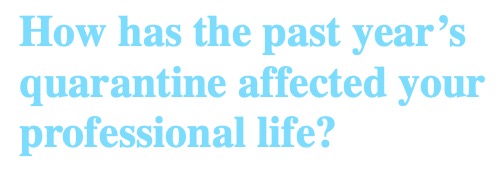Quarantine for me blurred professional and personal boundaries and clarified priorities for what should constitute professional life. It was of course a strain on time, compelling me to learn and troubleshoot new technology, adapt my pedagogy, and remain on constant alert for unfolding news about how the pandemic might impact our safety or force yet another change. Limitations imposed on travel were hard, and confinement was strained further by having my professional life intrude into my physical space. Zoom was the instrument of these peculiar circumstances, turning my home into a virtual classroom and office while also allowing me to “travel” out to virtual talks and conferences with participants scattered across continents and time zones. While these blurred activities were also opportunities, I resent how the format exerted physical strain on my body and mental strain on my psyche.
Quarantine could have meant unplugging from this simulated chatter and turning inward to focus on research, something desirable in a year of increased anti-Asian hate (and intra-Asian persecution, more globally). However, the year also reexposed disparities that are unacceptable for us to remain indifferent to—issues of access, labor exploitation, lack of diversity, and unchecked racism. Quarantine taught me to reject a professional life mediated by screens, but it also strengthened my resolve to advocate for vulnerable students and colleagues who are invested in but still underrepresented in our curricula and institutions.
BONNIE CHENG, art historian and associate professor, Oberlin College

